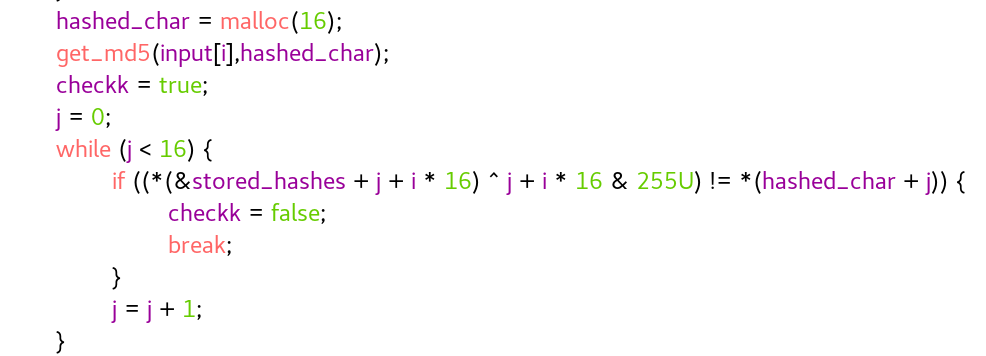ASCWG Key Validate

Written by Alya on

ASCWG CTF Writeups (2020)
Summary
Reverse Writeup
Download the binary here
At first the binary does some weird computations which turned out to be the stored hashes
Then, We’re asked to enter a 40 character long key

then it iterates through each character of our input, MD5 hashes it, and compares it to the stored hashes ^ index & 0xff

you can safely ignore every +i*16 in the decompilation as its only purpose is to get each two characters(one byte) of the stored hash.
so we’re left with this:
((stored_hashes[j]) ^ j & 255U) == hashed_char[j]
now to get the flag we need to:
- extract the hashes from the binary
- decode each hash
- hash each printable character and compare the hash with the stored hash (bruteforce the flag)
so we set a breakpoint at 0x0040137E and extract 40 * 16 bytes at 0x5658F088 using this plugin

here’s the final script:
x = "e359eda78df08665f904dd3a67686a913501d18305d0a867599b58252674408ec14635b4e10b33d04b11216ec46cc21d4224dcaf49a8f41eeaab207bd4a4d260cfe00e9e310ad78b2d1d83ac556482a8949b106bf4ec75d555950ac13328dac431efb0f64116ea8cb2adf6228a63c7bcc2848d34371307c19d4aa2a74a69fa22f2946c1ff91844ae5a1b90cb641462d000a272709167d1575b519797e4d5562ca366620f47307ea62a72ad05809d5e9bc2a45c2fc928749e6a2ba0fb542452e021a6d55401ebd330abf1c18e248c22fdab5a448900697633c26cc73c6fcebd7eaa6bea1379d251d07d8d7ad3ac66b1dcbbb2425d17a3d23a6d40eae367c03cce4153927591914009264153299c423a5293969e8203062e873616fae08bb5da65c379cd87add0a645d924fd1a47484ab1dcfafa4d7f69d4c91009b5e2ce9a84ccc236a2d2493047d2fc01333d5aaddfe22244bccf29c8947e8acb401bb4c4b200914863e5c1b5d7a9c34e9e8c10613307e0429290718731b7bbb177770435b6cc63d96d270d7006e579845dbae7e8ea115148679c1217cc8dbb9b76bfd55cef09d2b44c3fd938648e7a3bb0eb443442f0bc70c70a7444001f897a2359d5ca98deb2d42c5fb95804ee1a5bd08b24542290fd688c5dce47b16079c15f8d6edce5ec2f2cc267713083088e0e3512156a8a3542040db4b79387411dca2227cae97aa29032e2e001f741c7cbc107077445c6bc5a9b1ae38922a1208d7d8a235c96412c5234ccbf59b8e40efabb306bc4b4c27082c4cd7477534781dd0ae2e70a29ba6211cf90d66136caac928dd602aa43e79cb309bdf7dda0d635a9548d6a37383ac18caaaa1d2f3984994059e5b29ecad49c00cee9f1e6ebeee3a7cce2fea98d0098"
import hashlib
import string
from bitsbehumble import *
# split x into usable bytes
x = hexstring_to_array(x)
#decode the hashes
XORed_hash = ""
for j in range(len(x)):
byte= x[j]
xored_byte= hex( int(byte[2:],16) ^ (j & 0xff) )[2:].zfill(2)
XORed_hash += xored_byte
#create a list of the decoded hashes
hashes=[ XORed_hash[i:i+32] for i in range(0,len(XORed_hash),32)]
#bruteforce each chaaracter of the flag
flag=""
for i in range(len(hashes)):
for c in string.printable:
if hashlib.md5(c.encode()).hexdigest() == hashes[i] :
flag += c
break
print(flag)




Comments